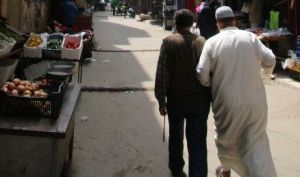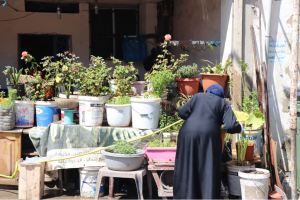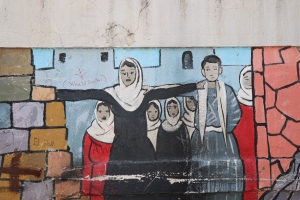Click on the names of our contributors below to see their contributions to our website.
If you are interested in writing a blog, please contact sorcha.daly@ucl.ac.uk. Guidelines for submissions can be found here.
Amal Shaiah Istanbouli
Amal is a researcher of the Southern Responses to Displacement Project based in Turkey, and a holder of MA degree from the Institute of Muslims Civilizations, AKU, London. In her MA thesis, she focused on the role of work and the conceptualisation of home in displacement based on her ethnographic field work in Antakya. Prior to joining the project Amal worked in many research projects such as the Mediterranean Missing migrant project, and other unpublished projects too. Amal is practically interested in displacement, forced migrations, the meaning of loss and identity crisis related to the Syrian context and refugees in general. She has been displaced from Syria since 2012, and she is currently based in Hatay, Turkey where she works as a consultant and an Arabic-English interpreter too. You can read Amal’s blog post ‘Research terminology from the ‘Global North’ to the ‘Global South’ -conceptualisations, interpretations and challenges from Hatay, Turkey’ here.
Ann-Christin Wagner
More information coming soon. You can follow Ann-Christin Wagner on @ann_wagner_ed. You can read Ann-Chritin’s blog post, “There are no missionaries here!” – how a local church took the lead in the refugee response in northern Jordan here.
Bushra Rehman
Bushra Rehman works as a Protection and Inclusion Coordinator for Islamic Relief Worldwide. She previously worked as a Research & Development Officer at Humanitarian Academy of Development where she developed a keen interest in research relating to humanitarian protection amongst displaced populations, specifically in protection against sexual and gender based violence (SGBV) and disability inclusion in humanitarian response. She has travelled to Jordan, Iraq and Tanzania for research and programmatic work. She has also completed an MSc in Conflict, Security and Development from the University of Birmingham. You can read Bushra’s blog post, ‘Before defining what is local, let’s build the capacities of humanitarian agencies‘ here.
Charlotte Al-Khalili
Charlotte Al-Khalili obtained a PhD in Social Anthropology from UCL (2019) titled “Of Revolutionary Transformations: Life in Displacement at the Syrian-Turkish Border” based on 18 months ethnographic fieldwork in Gaziantep. She is currently a postdoctoral researcher on the Southern Responses to Displacement ERC project and is based in Gaziantep where she has been living since 2015.
Diane al-Mehdi
More information coming soon. To read Diane’s blog, The Tribulations, and Deportations, of Syrian Guests in Turkey click here.
Elena Fiddian-Qasmiyeh
Elena is the Principal Investigator of the Southern Responses to Displacement project, Co-Director of the Migration Research Unit (UCL), and Coordinator of the UCL-wide Refuge in a Moving World interdisciplinary research network (@RefugeMvingWrld).
Elena is also the Principal Investigator of a 4-year AHRC-ESRC-funded project examining Local Community Experiences of and Responses to Displacement from Syria (@RefugeeHosts), through which she and her colleagues are focusing on the roles played by citizens and established (Palestinian and Iraqi) refugees in Lebanon, Jordan and Turkey in responding to the arrival of refugees from Syria since 2011. You can follow Elena on @FiddianQasmiyeh. You can read Elena’s blog posts here and here.
Emma Mawdsley
Dr Emma Mawdsley is a Reader in Human Geography and Fellow of Newnham College, and Director of the Margaret Anstee Centre for Global Studies. She has a particular interest in the ‘rising powers’ and the changing politics of development. She focuses on the politics (broadly interpreted) of international development, in South-South development cooperation and how this growing phenomenon and other national and global shifts are affecting the (so-called) ‘traditional’ donors. Recent work includes research on DFID’s growing private sector-led growth agenda, financialisation and development, and donor exit from and transition within partner countries. Emma is currently leading research funded by DFID into India’s growing presence as an international development partner.
Past research has included:
– Development politics, including work on the World Bank’s World Development Reports; development NGOs; the US’s Millennium Challenge Account; and the impacts and representations of China and India’s deepening relations with Africa.
– How India’s growing middle classes experience and construct environmental change. Research issues include how they attribute and explain agency, cause and consequence; implications for the poor and marginalised; and implications for environmental politics and environmental trends in India.
– Environmental issues in India more broadly, including environmental and regional politics in Uttarakhand, and the contested issues around Hinduism, the Hindu Right, and environmental ideas and practices.
For more information on Emma’s work click here, or follow her on @EmmaMawdsley. Listen to Emma’s podcast for Southern Responses to Displacement here.
Estella Carpi
Estella was the Research Associate on the Southern Responses to Displacement project until 2022. Prior to joining the project Estella worked as a researcher for several academic and research institutions in the Middle Eastern region. Her work has focused on displacement, forced migration, social welfare, gender equality, and humanitarian aid provision in the Arab Levant and Turkey. She has lectured extensively in the Social Sciences in Italy, Australia, and Lebanon. She has a PhD in Social Anthropology from the University of Sydney (Australia), with a study on social responses to crisis and crisis management in Lebanon. After studying Arabic in Milan and Damascus (2002-2007), she received a MPhil degree in Linguistic Anthropology. For more information about Estella, click here, or follow her on @estycrp. You can read Estella’s blog posts here.
Fatmanur Delioğlu
Fatmanur completed her BA in Political Science and International Relations at the Yıldız Technical University, in 2016 with a dissertation on Syrian Refugee Women: The Case of Fatih District in Istanbul. She completed an Erasmus internship at the Gender and Diversity Institute in Kiel, Germany (2016) and participated in a research project analyzing Turkish media coverage of Syrian refugees at Center for Middle Eastern Studies at Lund University (2018). She completed an internship at Istanbul Policy Center(2019) She is a guest researcher in Migration Research Center at Koç University (MiReKoc)right now. Her research interest include integration policies, refugee solidarity networks, gender, social cohesion and role of non-governmental organizations in constructing social peace. You can read Fatmanur’s blog post, ‘The ‘Al Shami Kitchen Project’ – Solidarity amongst Syrian Refugee Women in Izmit, Turkey‘ here.
Francesco Carella
Francesco is a Labour Migration and Mobility Specialist at the International Labour Organization (ILO) currently covering Central America, Mexico, Haiti, and the Dominican Republic, and previously covering North Africa. Prior to joining the ILO, Francesco worked on migration and development, forced migration and refugee issues, trafficking in human beings, migrants’ rights, and local integration for IOM, the UN Secretariat, and UNHCR.
Hanna Schneider
Hanna Schneider is a PhD Researcher at the Vrije Universiteit Brussel. Her PhD project focuses on refugee resettlement and explores refugees‘ perspectives and agency within the resettlement process in Jordan and Turkey. Prior to the PhD, Hanna worked as a project manager in civic education where she organized and conducted seminars on EU asylum policies. She can be followed on www.hannaeschneider.com and @HE_Schneider and contacted at hanna.schneider@vub.be. You can read Hanna’s blog post, ‘How Did it Feel to Ask those Questions?’ – An Email Exchange about Experiencing Research on Displacement‘ here.
Israa Sadder
Israa Sadder is a translator, researcher & English trainer based in Jordan who has worked in different Phd, Master and INGO research projects focusing on Syrian, Iraqi, Palestinian, Sudanese and Somalis refugees. Israa holds a Professional Diploma in Forced Migration and Refugee Studies from the University of Jordan. Israa is a feminist and an activist engaging in the empowerment of Syrian refugees in Jordan. You can read Israa’s blog piece, ‘How did it feel to ask those Questions? – An Email Exchange about Experiencing Research on Displacement’ here.
Janaka Jayawickrama
Currently based at the University of York as a Senior Lecturer, Dr Janaka Jayawickrama started his career in Sri Lanka in 1994 as a local humanitarian worker. He collaborated with conflict affected Tamil, Sinhala, Muslim and other communities in Sri Lanka to help improve their wellbeing in uncertain and dangerous times. He has played key roles in various humanitarian responses including tsunami responses in Sri Lanka (2004), IDPs in Western Darfur, Sudan (2005), Afghan refugees in Pakistan (2006), refugees in Malawi (2006) and Iraqi refugees in Jordan (2007). Throughout his career Janaka has worked within and between academia and policy and practice in disasters, conflicts and uneven development. Currently, he collaborates with academics, policy makers and community groups in Iraq, Lebanon, Bangladesh, Sri Lanka, South Africa and Kenya on various education and project activities related to community wellbeing. His on-going work on community wellbeing seeks to shape future policy and practice on humanitarian and recovery interventions in disasters and conflicts. You can read Janaka’s blog post, ‘Before defining what is local, let’s build the capacities of humanitarian agencies’ here.
Josep Zapater
Josep Zapater is a UNHCR staff member and former Head of Suboffice for UNHCR in the Bekaa valley, Lebanon and has previously served in the Central African Republic, Cameroon, Afghanistan and Colombia, among other duty stations. His blog can be found at www.josepzapater.net and presents general opinion pieces on humanitarian work, mostly based on field experience, conversations with refugees and colleagues and readings. You can read Josep’s blog ‘Humanitarian leadership: developing social capital with affected populations‘ here.
Lina Khoury
Lina Al Khoury is a life coach and mental health counselor and the founder of the Kahkaha project operating in the Palestinian refugee camps in Lebanon. Previously, Lina has worked in prisons, refugee camps and with people with substance addiction. For more information see www.linaalkhoury.com. You can read Estella Carpi’s blog post, ‘In conversation with the Kahkaha project in Lebanon: an effective example of a Southern-led initiative,’ in which Lina and her initiative, the Kahkaha project, are featured here.
Louise Olliff
Dr Louise Olliff has worked for different non-governmental organisations in Australia, Cambodia and Ghana since 2001. Between 2009-2019 Louise worked for the Refugee Council of Australia in various research, policy, advocacy and community engagement roles, her last role being as Senior Advisor on Policy and Community Engagement leading the International and Community Engagement Team. Her research interests are in refugees and forced displacement, diaspora humanitarianism, global governance, grassroots activism, diasporas and transnationalism, critical development and humanitarianism studies. Louise has a PhD in Anthropology and Development Studies (University of Melbourne), MA in Collaborative International Development Studies (University of Guelph) and BA Hons in Journalism/International Development Studies (Deakin University). She currently works as a sessional lecturer in the School of Social and Political Sciences at the University of Melbourne, is a board member of Eritrean Australian Humanitarian Aid (since 2009), Cisarua Learning (since 2019) and the Australian Syrian Charity (since 2019, advisory role), and keeps bees. Twitter: @LouOlliff You can read Louise’s blog post here.
Maissam Nimir
Maissam Nimer is a Mercator-IPC fellow at Sabanci University and the recipient of a one-year Koç University Seed Grant exploring the experiences in language learning among Syrian refugees in Turkey. As a postdoctoral researcher at Koç University, she works on the topic of experiences of Syrian refugee youth in Turkey. She obtained a PhD in sociology at Paris Saclay University in July 2016. In her thesis, she looked at the mechanisms of social and cultural selection that explain the inequality of access to higher education in Lebanon. Nimer teaches a course in sociology of education at Galatasaray University in Turkey. She holds an MSc from the London School of Economics and BS from the American University of Beirut. You can read Maissam’s blog, ‘Reflections on the Political Economy in Forced Migration Research from a ‘Global South’ Perspective‘ post here.
Meltem Ozturk
Meltem studied Arts and Cultural Management at Istanbul Bilgi University. Besides her studies, she has been interested in the themes of migration since her family came to Turkey from Bulgaria in 1989. The case of Bulgarian Turks was an inspiration to study another group of people that had to migrate from their country more recently, namely Syrians. She wrote her dissertation about local cultural policies towards Syrian refugees in Turkey. During her university years, she was involved in exhibition projects and did internships at different galleries such as Mixer and Rem Art Space. She worked in IKSV, Istanbul Jazz Festival and Istanbul Biennial and in several exhibitions as an assistant in 5533. She has also held the role of Account Executive at Flint. She is currently a masters student in Applied Cultural Analysis at Lund University. You can read Meltem’s blog, ‘Municipal-level policies towards Syrian refugees in Turkey: The case of Bursa‘ click here.
Mohammad-Mahmoud Ould Mohamedou
Mohammad-Mahmoud is Professor of International History and International History Department Head the Graduate Institute of International and Development Studies in Geneva and Faculty Associate at the Centre on Conflict, Development and Peacebuilding and the Albert Hirschman Centre on Democracy. For more information about Mohammad-Mahmoud click here. You can read Mohammad-Mahmoud’s contribution to the Southern Responses to Displacement website, ‘The Rise and Fall of Pan-Arabism’ here.
Naohiko Omata
Naohiko has a PHD in Development Studies from the School of Oriental and African Studies (SOAS) and is Associate Professor at the Refugees Studies Centre, Oxford. Before joining the Refugees Studies Centre Naohiko was a Senior Teaching Fellow at SOAS and has also worked for UNDP and UNHCR and other international and local NGO’s in Sub-Saharan African countries. Naohiko has published widely on refugee livelihoods, rights and repatriation. For more information on Naohiko, click here.
Nobuyuki Asai
Nobuyuki Asai is the Chair of Youth Peace Conference of Soka Gakkai. In Soka Gakkai’s Office for Peace and Global Issues, he serves as a director for sustainable development and humanitarian affairs. He joined Soka Gakkai’s recovery taskforce in Tohoku region which was established after the Great East Japan Earthquake in 2011. After the Kumamoto Earthquake in April 2016 he served in Soka Gakkai’s relief coordinating team. He has participated in several UN conferences including the UN Conference on Sustainable Development in 2012 (Rio+20), the UN World Conference on Disaster Risk Reduction held in Sendai in 2015, and the World Humanitarian Summit in May 2016. He serves as a board member of Joint Learning Initiative on Faith and Local Communities and is a regular member of the Japan CSO Coalition for Disaster Risk Reduction. Nobuyuki was awarded a Bachelor of Law from Tokyo University and in 2018 he published an academic thesis titled “Function of social capital embedded in religious communities at times of disaster: Cases of disaster relief activity by a Muslim community and a Soka Gakkai community in Japan.” You can read Nobuyuki’s blog post here.
Nof Nasser-Eddin
Dr Nof Nasser-Eddin is co-founder and co-director of the Centre for Transnational Development and Collaboration. Nof obtained her MA in Race and Ethnic Studies, and PhD in Sociology from the University of Warwick. Nof’s research interests include, but are not limited to, women, gender, class, refugees, sexualities, masculinities, femininities, the labour market and economic activities. She has extensive research experience addressing women’s rights violations in Arabic-speaking countries, both through academic projects and working on the ground with local and international NGOs. You can read Nof’s contribution to the Southern Responses to Displacement website, ‘Decolonial approaches to refugee migration: Nof Nasser Eddin and Nour Abu-Assab in conversation‘ here.
Nour Abu-Assab
Dr Nour Abu-Assab is co-founder and co-director of the Centre for Transnational Development and Collaboration. Nour is a queer Palestinian feminist sociologist who was awarded a PhD in Sociology from the University of Warwick. Nour has extensive experience as a practitioner and an academic in the fields of human rights, gender, ethnic and sectarian conflict. Nour has a number of publications around identities, sexualities, migration, post-colonialism and methods of decolonising and has a book under the title Queering Ethnicities and Nationalisms in the Middle East. You can read Nour’s contribution to the Southern Responses to Displacement website, ‘Decolonial approaches to refugee migration: Nof Nasser Eddin and Nour Abu-Assab in conversation‘ here.
Sara Alhelali Saab
Sara is a researcher in the Southern Responses to Displacement project based in Gaziantep. She pursued Master of Public Health at the French National School of Public Health EHESP where she developed an interest for doing qualitative research particularly in migration and displacement-related topics and specifically in the Syrian context since has been displaced from Syria herself and has been working in the humanitarian field for the past nine years. You can read Sara’s blog, ‘The importance of place and language – Syrian, Turkish and Syrian-Turkish encounters in Gazientep’ here.
Selma Akay Erturk is Associate Professor in Human Geography at Istanbul University (Turkey). Selma’s research focuses on migration in the Middle East and North Africa and in the Balkans, and on the social, economic, cultural and spatial effects on rural and urban areas.
In addition to her interest in settlement geography in Turkey and Bulgaria, Selma has published on Syrian refugees’ and migrants’ experiences in Turkey, including Syrian refugees’ involvement in the agricultural sector in Turkey, labour migration in Turkey and settlement geography in Turkey and Bulgaria. She is author of the book “Urban Geography of Odemis City (Sehir Cografyasi Acisindan Odemis)” in Turkish.
Selma Akay Erturk was a visiting fellow in MRU in UCL for 2019-2020 academic year.
You can read Selma’s contributions to the Southern Responses to Displacement website here.
Sumaira will be starting her PhD at the Islamic Studies Institute at McGill in the Autumn of 2019. She works on literary relations between India and the Ottoman Empire. You can read Sumaira’s blog, ‘The Ottoman Empire in Indian Literary Imagination: Charting Shibli Numani’s Journey into Turkey Second Review‘ here.


